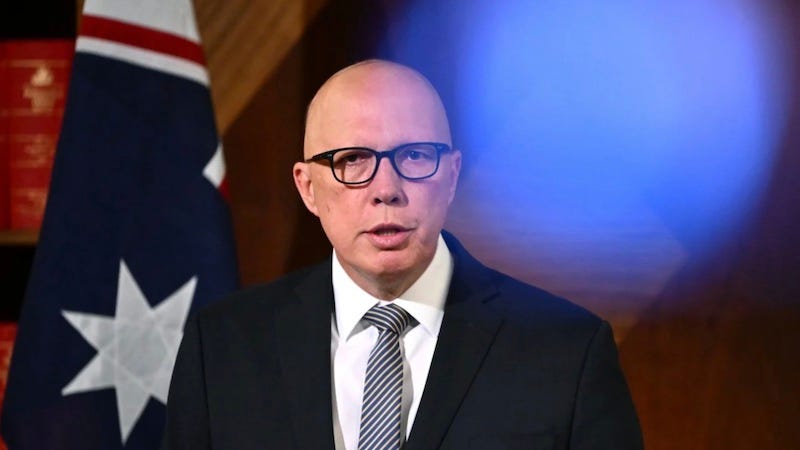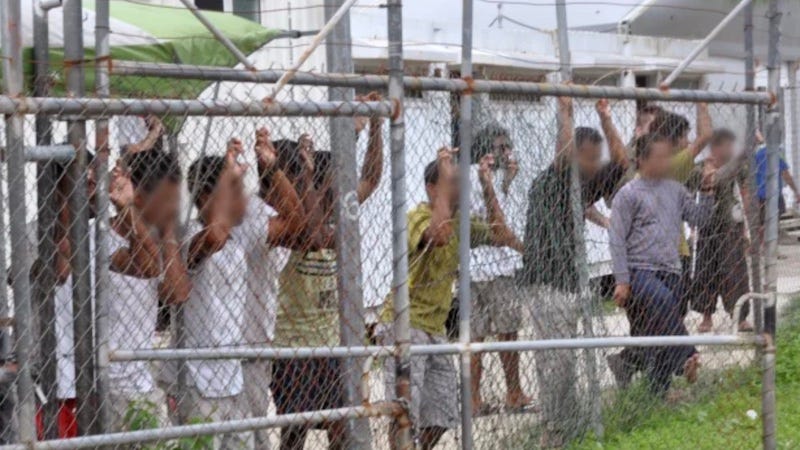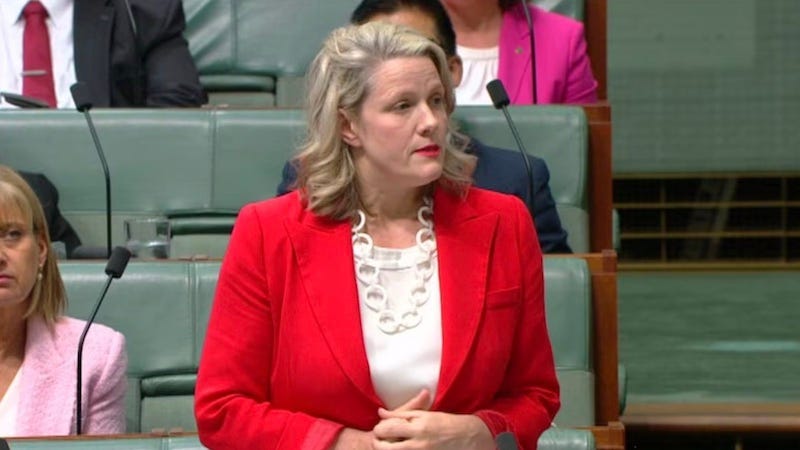The devil in Dutton’s details
A Home Affairs saga of mismanagement, corruption risks, and neglected accountability
The management and oversight of contracts within the Home Affairs Department under the tenure of Peter Dutton as Minister up until 2022 have come under intense scrutiny, revealing significant lapses in due diligence and a concerning disregard for potential corruption and fraud risks. The internal audit concerning the Paladin contract, in which the company operated the Manus Island detention centre, uncovers a series of failures that raise serious questions about the department’s commitment to transparency, accountability, and the efficient use of public funds, as well as Dutton’s lack of competence in the management of this department.
At the heart of the controversy is Home Affairs’ handling of the Paladin contract, worth $532 million, a critical component of Australia’s offshore detention regime. The audit’s findings that Paladin was selected without a proper assessment of its capability to manage detention centres are alarming and this lapse is compounded by the department’s failure to evaluate the risks of engaging in contractual relationships in Papua New Guinea, a region known for its challenges with corruption and fraud. Such oversight suggests a systemic flaw in the department’s procurement and risk management processes, directly implicating the leadership and oversight mechanisms in place under Dutton’s watch.
The revelation that the financial strength assessment conducted by KPMG was directed at the wrong entity within Paladin’s corporate structure further illustrates the depth of mismanagement. This critical error—if indeed it was an “error”—of evaluating Paladin Solutions instead of Paladin Holdings indicates a fundamental breakdown in the due diligence process. That the assessment focused on a construction arm rather than the offshore-processing arm tasked with managing a complex and sensitive operation such as Manus Island detention centre is a stark illustration of the department’s negligence and reflects upon a broader culture of complacency and a lack of accountability within the department.
The implications of these failures extend beyond administrative missteps. They touch on the integrity and effectiveness of Australia’s immigration and border protection policies, particularly as they relate to the management of offshore detention centres. The investigations revealing credible allegations of corruption in both the Nauru and Manus contracts, coupled with the Australian Federal Police’s initiation of foreign bribery investigations, underscore the potential for systemic abuse and exploitation within these contracts. Such developments not only tarnish the reputation of the Home Affairs Department—and that of Peter Dutton—but also raise profound ethical and legal concerns regarding Australia’s treatment of asylum seekers and its commitment to upholding standards of governance and accountability.
In light of these findings, the response from then-Minister Dutton, as evidenced by his mere acknowledgment of the audit report without further action or inquiry, is particularly disconcerting. This response suggests a lack of engagement with the audit’s critical findings and a missed opportunity to address and rectify the identified deficiencies. The lack of substantive reaction from the ministerial level highlights a concerning indifference to the principles of responsible governance and oversight, further compounding the gravity of the department’s mismanagement under his tenure.
A deeply concerning lack of accountability
The unfolding narrative around the management of contracts within the Home Affairs Department, particularly under Dutton’s ministerial responsibilities, intensifies as further details emerge about the extent of mismanagement and the lack of accountability. Labor Senator Deborah O’Neill’s critique at Senate Estimates hearings highlights a fundamental issue at the core of this saga: the apparent indifference by Dutton to deeply concerning audit findings, encapsulated in his minimal response to the damning internal audit.
This attitude, where significant concerns over a half-billion-dollar contract were met with a mere acknowledgment, underscores a troubling disconnect between the responsibilities of high office and the actions (or lack thereof) of those tasked with such roles.
The report’s indictment of senior officials for failing to leverage intelligence to prevent financial dealings with companies linked to alleged serious crimes over a decade further exacerbates concerns about systemic failures within the department, and the former minister. The current Home Affairs minister, Clare O’Neil, has characterised the findings as “extraordinary” and the investigation by prominent media outlets into suspect payments underscore the gravity and breadth of the mismanagement and corruption risks involved.
The Australian Greens’ immigration spokesman, Senator Nick McKim’s condemnation of the failure to identify responsible parties, captures the broader frustration and concern over the lack of accountability. The Senate committee’s inquiries into investigations related to criminal activities, including attempts to circumvent U.S. sanctions against Iran and links to drugs and arms smuggling, further illuminate the scope of the department’s challenges.
Why did Dutton exhibit such indifference to these issues during his tenure as Minister for Home Affairs? Was he so preoccupied with the leadership challenges to then-Prime Minister Malcolm Turnbull in 2018—and equally absorbed by the subsequent opportunity to contest during Scott Morrison's tenure—that any developments within the department became secondary concerns, with his role merely serving as a stepping stone to the prime ministership? Alternatively, is Dutton merely an incompetent leader who also ignored the persistent corruption within his department? Is he fit to be Prime Minister, if he were to ever win a federal election?
There needs to be a re-evaluation of the structures and practices that allowed such failings to occur, underscoring the imperative for systemic reforms to restore integrity and public trust in the department and its leadership.
Dutton needs to take responsibility for the failings in Home Affairs
The scrutiny of Dutton’s tenure as Minister for Home Affairs deepens with considerations of the broader implications of his leadership decisions and the department’s operational shifts. The transformation of the Australian Customs Service into the Australian Border Force under Dutton’s watch in 2015 symbolises a significant change in the approach to border security, marked by an emphasis on a militarised perception and enforcement. This shift, colloquially known by its critics a “Border Farce,” reflects a contentious rebranding that appeared to prioritise appearance over efficacy, particularly in addressing high-level smuggling and maintaining efficient border operations.
Dutton’s defence in all of this has been to emphasise his lack of involvement in contract negotiations or the execution of agreements, but it does little to absolve the broader accountability issues that plague the Home Affairs Department. The Richardson report seems to shift the ministerial responsibilities in the regional processing contracts and procurement decisions towards the department’s senior officials. However, under the conventions of the Westminster system, it is the minister who takes all responsibility for their portfolio, whether they caused the problem, or not.
This system predicates that ministers are ultimately accountable for the actions and failures of their departments, a convention that raises questions about Dutton’s responsibility for the lapses and scandals that occurred on his watch. If the minister isn’t responsible for failings with the system, who is? It’s the fundamental basis of ministerial responsibility in all democracies: without it, democracies fail.
The lack of interest from the mainstream media
There have been suggestions from conservative media—most notably, News Limited—that the current Labor government’s focus on these scandals might serve as a diversion from its challenges but even if they were, it does not diminish the gravity of the allegations under Dutton’s administration. The Paladin contract scandal, alongside other mismanagement issues, represents a significant concern that has not been adequately addressed by the media or political discourse. The lack of widespread outrage or accountability for these missteps highlights potential deficiencies in public and media scrutiny of government operations.
The limited scrutiny from both the media and the public, especially regarding immigration and asylum seeker issues, mirrors a wider societal and political dynamic. These subjects, often sensationalised and polarising, can be twisted into narratives of “fear and loathing,” a strategy the Liberal Party has historically employed for political gain. A prime example occurred when 43 asylum seekers from Pakistan, Sri Lanka, and India arrived in the remote Western Australian town of Beagle Bay. This event triggered the typical irrational response from the Liberal Party and mainstream media, which described the situation as a “catastrophe” and proclaimed the “loss of control over our borders,” framing it as a threat to the Australian community.
It is a clear indicator of the immaturity, racism, and bigotry within the Liberal Party and conservative media when the arrival of 43 individuals is portrayed as an existential threat to an Australian population of nearly 27 million people.
The current Labor government’s strategic focus on Dutton’s role, steering clear of directly invoking the contentious issues of immigration or asylum seekers, illustrates a nuanced approach to political critique and by concentrating on allegations of drug smuggling and weapons trafficking, the government’s aims to construct a narrative that questions Dutton’s competence and suitability for higher office without inflaming already divisive topics.
It’s evident that the Labor government is intensifying its critique of Dutton ahead of a potential federal election and this indicates a strategic positioning meant to shape public opinion, as well as an increase in political pressure, with the intention of highlighting Dutton’s perceived shortcomings to the electorate at a time when assessments of both the government’s performance and any alternatives provided by the opposition will be coming to the fore. The essence of this strategy is not just to critique Dutton’s past actions but to frame him as a liability for the future, particularly in the context of leadership and governance.
Dutton’s role within the Home Affairs Department and the subsequent political ramifications offers a microcosm of the broader challenges facing contemporary Australian politics. Issues of governance, accountability, and political strategy converge, underscoring the importance of ethical leadership and the impact of political narratives on public discourse and trust, especially at a time when it was lacking from the Coalition government between 2013–22. As the political landscape evolves, the lessons drawn from this period will need to inform future debates on governance, policy, and the ethical responsibilities of those in public office.











